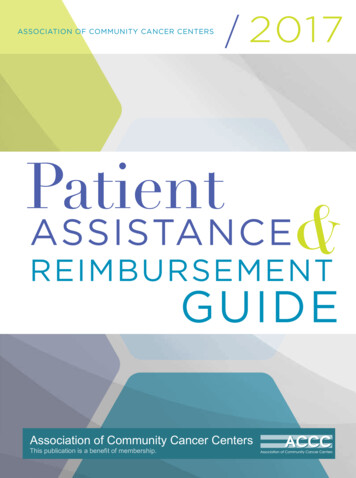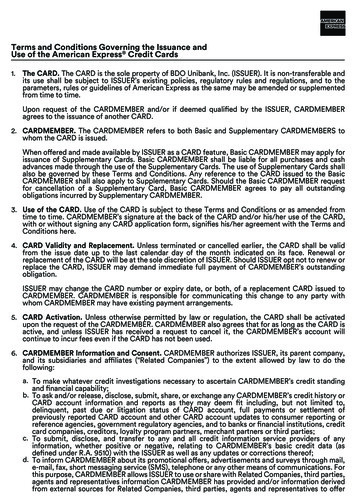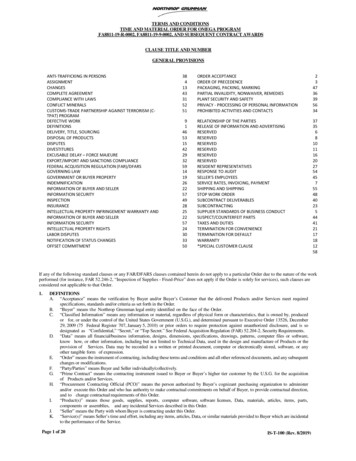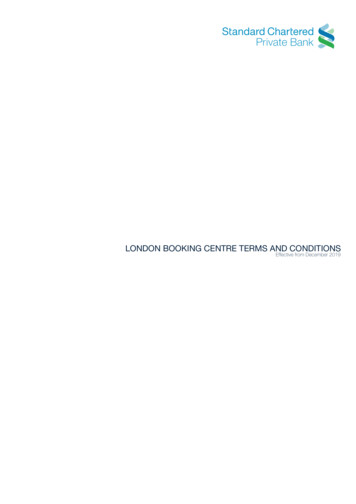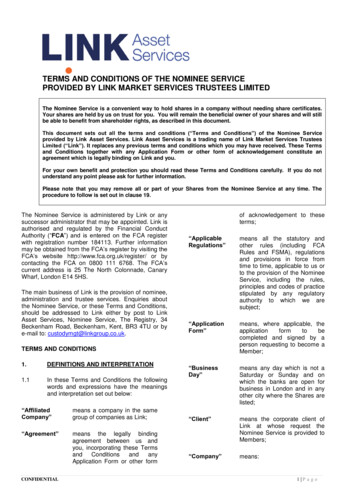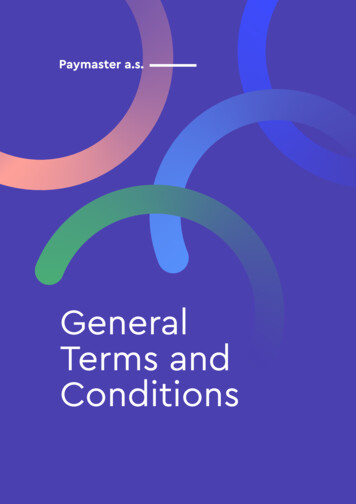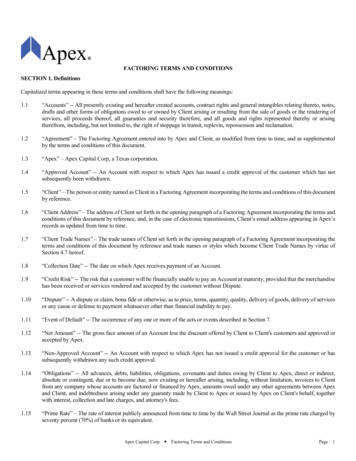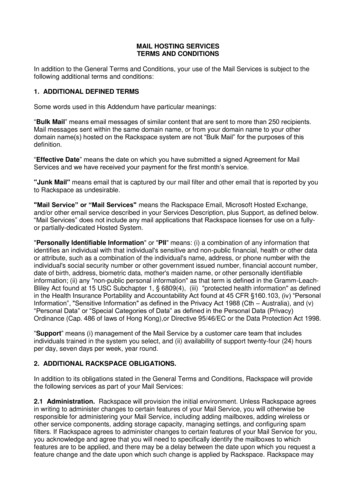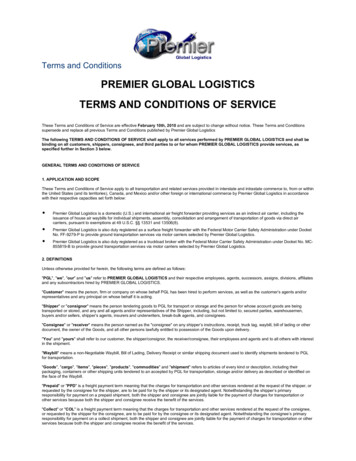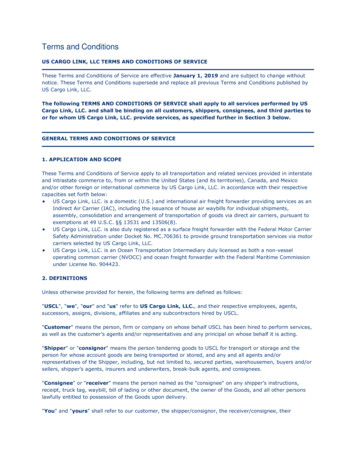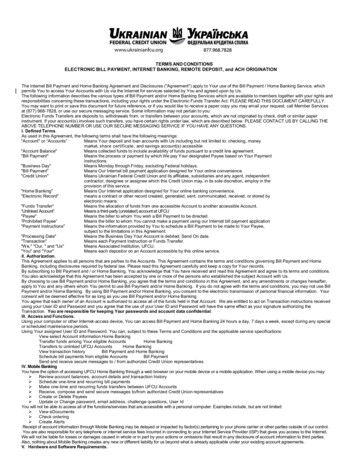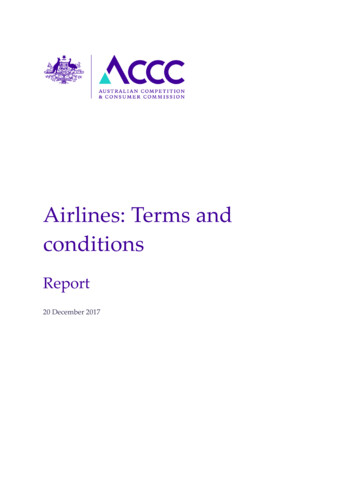
Transcription
Airlines: Terms andconditionsReport20 December 2017
Executive SummaryThe Australian Competition and Consumer Commission (ACCC) has examined issuesarising in the Australian airline industry relating to consumer guarantee rights and contractterms which may be unfair.Consumer guarantees relating to services provided in industries such as the airline industryare a current priority for the ACCC. Airlines must ensure they comply with the AustralianConsumer Law (ACL), avoid unfair contract terms and make sure their terms and conditionsare consistent with consumer guarantees.Between 1 January 2016 and 14 December 2017 the ACCC received over 1400 consumercomplaints about airlines. These included hundreds of complaints relating to consumerguarantees and excessive fees.The ACCC has reviewed complaint data from its own records, state fair trading agencies andconsumer group CHOICE about the largest Australian-based airlines (the Airlines) and hasidentified the following issues of focus:1. ‘no refund’ statements on the Airlines’ websites;2. excessive fees for flight cancellations and changes; and3. the application of consumer guarantees, including statements made about a customer’sconsumer guarantee rights under the ACL, in circumstances where flights have beencancelled or delayed.The purpose of this report is to highlight common consumer issues arising in the airlineindustry and the ACCC’s concerns, and to inform consumers of their ACL rights whendealing with airlines. Where consumer issues continue, the ACCC will take action to addressconcerns.1. ‘No refund’ statementsA number of airlines make statements on their websites that sale, low cost and non-flexibleeconomy fares are non-refundable. These statements most commonly appear in sectionsoutlining the Fare Rules.‘No refund’ statements may lead consumers to believe they are not entitled to a refund underany circumstance. However, consumers who purchase goods and services have rights toremedies under the ACL which businesses cannot restrict, alter or remove.In most instances the ‘no refund’ statement is qualified in the Airlines’ Conditions ofCarriage, which explain when a refund can be obtained and refer to the ACL obligations.However, the ACCC is concerned that these qualifications are not sufficient to clarify theinitial and prominent no refund representation. The Airlines’ Conditions of Carriage arelengthy, often in fine print, and it can be difficult for consumers to find the relevantinformation.The appearance of airline online platforms and the way information is displayed has evolvedsince we announced our focus on the industry’s practices. The ACCC will continue tomonitor how information about refunds is conveyed by the Airlines, and take enforcementsteps where broad and misleading ‘no refund’ claims are made.Airlines: Terms and conditions1
2. Excessive fees for cancellation and changesAll of the Airlines have provisions in their respective Conditions of Carriage and/or FareRules that outline the fees that will be charged to consumers who cancel their flights or makechanges to their bookings once a ticket is purchased.Generally the fees are a fixed amount regardless of the price of the fare, but can sometimesvary depending on the fare type and the destination.Consumer complaintsComplaints indicate that consumers consider cancellation fees to be excessive, andtherefore unfair, in circumstances where: the amount of the fee does not take into account how far in advance the cancellation orchange occurs, such as when the airline might have sufficient time to resell the seat; the fee represents a significant proportion of the original airfare;eg. Consumer A purchased return flights from Los Angeles to Sydney for four peoplewith an Australian airline, for a total cost of 3,500. Approximately 35 days prior todeparture, Consumer A cancelled the flights. The airline charged a cancellationfee of 500 per person. This equated to a total fee of 2,000 for fares totalling 3,500 (approximately 57%).1the cancellation or the change was caused by the actions of the airline, for example,where a consumer cancels due to the airline changing the date and time of the flight, andproviding alternatives not acceptable to the consumer.eg.Consumer B booked a flight from Melbourne to Gladstone via Brisbane. Theairline cancelled the Melbourne to Brisbane flight and rescheduled it to a timewhich clashed with the Gladstone to Brisbane leg. The airline advised consumer Bthat they could be placed on an earlier originating flight, but to make this changeconsumer B would have to pay an 80 change fee.Unfair contract termsThe ACL protects consumers from unfair contract terms in standard form contracts. Theseare contracts which are prepared by one party and offered on a ‘take it or leave it’ basis.Contracts between the Airlines and their customers are standard form contracts.To be ‘unfair’, a contract term must: cause a significant imbalance in the parties’ rights and obligations; not be reasonably necessary to protect the legitimate interests of the party advantagedby the term; and cause financial or other detriment if it were relied on.For more information on unfair contract terms, please visit our website ements/unfair-contract-terms1The examples in this report are taken from real consumer experiences.Airlines: Terms and conditions2
Are fees charged by Airlines unfair contract terms?The ACCC recognises that the Airlines differentiate fares with different levels of flexibility.This means that a consumer often has less flexibility to cancel or change their flight detailswhen they have purchased a cheaper fare. This is not problematic in itself.However, where the size of the fee imposed by the airline to cancel or change a flight isdisproportionate to the cost of the original fare, or is unrelated to costs, then concerns mayarise.The ACCC is particularly concerned with fees imposed by airlines where the charges are theresult of decisions or circumstances within the control of the airline rather than the consumer– for example, the circumstances of Consumer B in the example above. A contract term thatallows for the application of a change fee in circumstances where the airline has cancelledthe flight is, in the ACCC’s view, likely to be unfair.Another example of a term that may amount to an unfair contract term is one which enablesthe airline to penalise a consumer for breaching or terminating the contract, but does notpenalise the airline for breaching or terminating the contract. From the complaint data, thereappears to be an imbalance in rights between consumers and the Airlines, and the Airlinesare entitled to make unlimited changes whereas the consumer is financially penalised formaking even minor adjustments.The ACCC will be engaging with the Airlines to understand exactly how, when and whythese fees are charged, and is likely to take action where unfair contract term provisions areidentified and not addressed.3. Consumer Guarantees: Changes and cancellationsThe ACCC has identified that complaints about the Airlines commonly arise when:1. a flight is delayed or cancelled, causing the consumer to miss a specific event orobligation;2. a flight is delayed or cancelled, causing the consumer to incur financial losses while theywait for the next scheduled flight e.g. accommodation, transport, food, missed flightconnections;3. a flight is changed by the airline to an unsuitable time for the consumer; or4. due to the actions of the airline (e.g. cancellation, delay or reschedule), the consumerseeks reimbursement for purchasing a fare to the same destination with another airline.Consumer guaranteesThe ACL creates a basic set of guarantees for consumers who acquire goods and services.These are intended to ensure that consumers receive the goods and services that they payfor. When these consumer guarantees are not met, consumers are entitled to a remedy. Theremedy consumers are entitled to will depend on whether the failure to comply with theguarantee is major or minor.There are three guarantees relating to the supply of services such as airline travel: guarantee as to due care and skill; guarantee as to fitness for a particular purpose; and guarantee as to reasonable time for supply.Airlines: Terms and conditions3
For more information on consumer guarantees, please visit our website s-guarantees/consumer-guaranteesAirlines terms and conditionsEach airline has policies which outline the remedies offered to consumers affected by a flightdelay or cancellation. From the ACCC’s review of these policies, there does not appear to bea consistent approach by the Airlines about the remedies provided to consumers affected bya flight cancellation or delay.Airline policies state that they will use reasonable endeavours to operate in accordance withtheir schedule, and due to the nature of air travel, they do not guarantee flight times.However, the Airlines all adopt an approach that seeks to differentiate between events withinthe Airline’s control and events outside the Airline’s control. There is no common definitionfor either term. From a review of their policies, it appears that they treat: events within the Airlines’ control as including issues with staffing or aircraftmaintenance. events outside the Airlines’ control as including weather, issues with air traffic controlor problems at the airport.More generous remedies for cancellations and delays are provided for events within theAirline’s control.Some consumers have raised concerns with the ACCC that events within an airlines controlhave been described as being “outside their control”. They speculate that an airline’sdecision to cancel a flight due to low passenger numbers has been presented as beingcancelled for a different reason. This issue is of significant concern to the ACCC and we willbe making specific enquiries of the Airlines to examine it further.The ACCC is also concerned about instances where an airline’s policies outlining remediesoffered to consumers are not consistent with a consumer’s rights under the ACL. This couldlead to an airline failing to provide a consumer with a remedy they are entitled to under theconsumer guarantees, as well as the airline making misrepresentations to the consumer,whether orally or in writing.Consumer complaintsThe ACCC has reviewed a large number of consumer complaints in relation to theirinteraction with the Airlines. Consumers expressed a range of concerns, including: receiving only a partial remedy or no remedy in circumstances where they may beentitled to one;eg. Consumer C booked return flights from Brisbane to Canberra. The airlinecancelled the return flight so consumer C sought a refund for his return flight. Theairline refused to provide a refund unless Consumer C paid an 80 fee.when consumers do receive a remedy, the airline represents that it is providing theremedy out of ‘goodwill’, in circumstances where the consumer was entitled to a remedyunder the ACL;eg.Consumer D purchased two tickets for his family members. At the gate, the airlinesaid that the flight was overbooked. The airline offered to place the twopassengers on a flight the next morning but required a 50 change fee perperson. The fee was later refunded as a ‘gesture of goodwill’ by the airline.Airlines: Terms and conditions4
the Airlines appear to offer remedies to consumers on an ad hoc basis, rather thanthrough a consistent and reasoned application of their policies and procedures; consumers may engage with airlines through a variety of channels including face-to-face(e.g. at an airport), phone, instant messaging etc. On each occasion an individualconsumer contacts the airline they may receive inconsistent responses about how theircomplaint will be resolved; consumers receiving a remedy in the form of a travel voucher or credit with the airlineinstead of a refund or compensation. These travel vouchers or credits often containconditions on how to use it and when it needs to be redeemed. The ACCC’s view is thatthese travel vouchers or credits are not equivalent to a refund, and should not be used asa substitute when a consumer is entitled to a refund under the ACL;eg. Consumer E booked a same day return flight from Sydney to Canberra. Prior totake off, the flight was cancelled due to a mechanical fault. The delay extendedbeyond the departure time for Consumer E’s return flight from Canberra back toSydney. Consumer E sought a refund from the airline, but was advised that theairline does not provide refunds, and was provided with a flight credit instead.an airline cancels or delays a flight and the consumer has to book an alternative flight,either with the same or a different airline, and the airline refuses to refund or compensatethe consumer for this additional cost.eg.Consumer F booked a flight from Sydney to Melbourne. The flight was cancelledprior to take off. Consumer F was informed there would not be a replacementflight and that she would only be entitled to a refund. After booking a flight withanother airline for the next day, Consumer F was informed that the original airlinehad rescheduled her flight for the next day. Consumer F was provided with arefund for the original fare but was denied a refund for the additional cost ofrebooking her flight with another airline.The ACCC considers that these examples may raise a number of concerns under theconsumer guarantees regime in the ACL.ConclusionAirlines must ensure they comply with the ACL, avoid unfair contract terms and make suretheir terms and conditions are consistent with consumer guarantees.In the event of a dispute with the airline, consumers should keep the following documents: tickets; flight itinerary; boarding passes; receipts of any costs incurred; and any communications with the airline.It is also beneficial to keep detailed notes of any interactions with airline staff either o
lengthy, often in fine print, and it can be difficult for consumers to find the relevant information. The appearance of airline online platforms and the way information is displayed has evolved since we announced our focus on the industry’s practices. The ACCC will continue to monitor how information about refunds is conveyed by the Airlines, and take enforcement steps where broad and .
